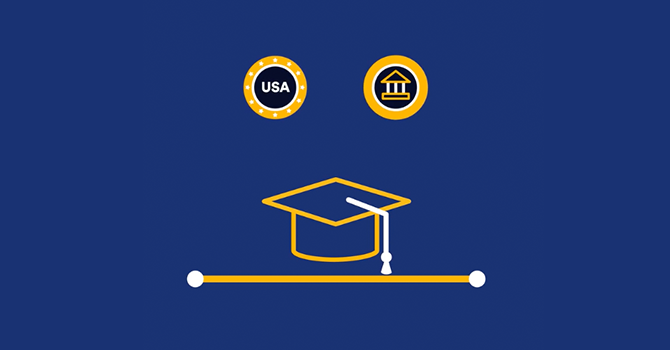Balancing Student Loan Stress and Mental Health
Ep. 12 discusses the connection between student loan debt and mental health.

Hosts:
Laurel Road Head of Design & Content, Eric Sutton and Laurel Road Chief Marketing Officer, Kaitlin Walsh-Epstein
Guests:
Financial Therapist, Aja Evans
Season 1, Episode 12
Listen to a timely conversation about the connection between student loan debt and mental health, financial wellness, and the challenges student loan borrowers will face when the federal student loan payment pause expires.
Transcript
Eric Sutton [00:00:07]: Hi everyone, this is Eric and you’re listening to Financing Ambition, a Laurel Road podcast. Today we’re going to be talking about a topic that we know is very top-of-mind for Laurel Road members, including doctors, nurses and other healthcare professionals and all of our listeners: Student loan debt. And in particular, how student loan debt can affect mental health.
So first, let’s go over some facts. So, we know the total for U.S. student loans has reached $1.75 trillion this year, according to the Federal Reserve. And for doctors in particular, the Association of American Medical Colleges or AAMC, reported this year that 73% of medical school graduates have student loan debt, and nearly one in five medical school graduates have more than $300,000 in student loan debt, with an average of $200,000 for 2021 med school graduates. We also know from our own Laurel Road poll that nearly 72% of Americans under 40 years old say that managing their finances is a strain on their mental health.
For expertise on managing financial stress, I am very happy to welcome back to the podcast, our dedicated financial therapist and licensed mental health counselor, Aja Evans. Aja brings over a decade of experience in the mental health field, working with clients on their relationship to money, financial anxiety, work stress, and self-esteem. Aja, welcome back to the podcast. Great to be with you again.
Aja Evans [00:01:41] Thanks, Eric. Glad to be back and really excited to get into it.
Eric Sutton [00:01:44] And we’re also happy to be joined today by a very special guest co-host, Laurel Road’s Chief Marketing Officer Kaitlin Walsh-Epstein. Thanks for joining us, Kaitlin.
Kaitlin Walsh-Epstein [00:01:54] Thanks, Eric. So glad to be here addressing such an important issue affecting millions of people, especially young professionals. And it’s particularly timely, too, with President Biden’s recent announcement about the new student loan relief plan and end of the federal student loan pause, as well as just lots of buzz around rising interest rates yet again. So, really looking forward to diving into the discussion today.
Eric Sutton [00:02:16] Oh, yeah, very timely, indeed. Student loan debt has been in the news a lot in the past few months, particularly the past few weeks. So let’s get right into it. Kaitlin, could you quickly recap for listeners what the Biden administration announced on August 24th and what that means for folks with student loan debt?
Kaitlin Walsh-Epstein [00:02:37] Yes, a few key takeaways from President Biden’s new proposed student loan relief plan. First, it’s really important to note that the plan applies to federal student loan debt only. It does not apply to private loans. That’s number one for everyone to know.
If you do have federal student loan debt, you may be eligible for some form of cancellation. Under the plan, the Department of Education will provide up to $20,000 in debt cancellation for Pell Grant recipients with loans held by the Department of Education, and then up to $10,000 in debt cancelation for non-Pell Grant recipients. An important caveat for this, though, is that it’s only for people who earned less than $125,000 as an individual, or $250,000 as part of a married couple in 2020 or 2021. So, if you earned more than that in adjusted gross income, you may not be eligible. The plan is really intended to help low- and middle-income borrowers.
Eric Sutton [00:03:38] Yep, that’s a really good call out, Kaitlin. And I think that’s where the additional $10,000 for Pell Grant recipients comes into the picture.
Kaitlin Walsh-Epstein [00:03:46] Exactly.
Eric Sutton [00:03:47] In that, those grants were originally directed at low-income borrowers as well.
Kaitlin Walsh-Epstein [00:03:52] That’s exactly right, Eric. And then another important part of the relief plan is proposed changes to the federal program for income-driven repayment or IDR. So, there are certainly a lot of possible changes for federal student loans on the horizon, and it’s important for borrowers to understand what their options are and really educate themselves. And then the last key takeaway from the announcement is that the pause on federal student loan repayment will be extended one final time through December 31st, 2022. That payment pause has been in place since March of 2020. Borrowers should expect to resume their monthly payments in January of 2023 and really be prepared to recalibrate their budgets. Again, a lot of people who hold federal student loans haven’t had to make payments on these student loans for almost three years now, so it will have an impact on their budgets in the upcoming year. Those are the main points of the announcement, but if anyone listening has any other questions about the details and what they should do for next steps if they believe they qualify, we have a great FAQ resource about the announcement on Laurel Road’s Resource Hub and there’s also a lot of detailed information on studentaid.gov to help you see which programs you may qualify for and what your next steps could be. We’ll include links to both in the summary notes of the episode.
Eric Sutton [00:05:11] Yep, of course. And thank you, Kaitlin, for that very helpful context. Appreciate that. Obviously, the end of the federal student loan payment and interest pause is going to mean a big financial change for many people’s budgets. And it’s coming up really soon. Aja, are you seeing a lot of stress around this topic with some of your clients? And if you are, what are some of your recommendations for those people who are feeling that stress about having to make those student loan payments again?
Aja Evans [00:05:42] Yeah, Eric, I have a variety of clients who have continued to make student loan payments over the last couple of years. But I do have other clients who are definitely stressed out about working that student loan payment back into their budget. So, it does vary. When Laurel Road recently polled federal student loan debt holders, we saw that one in five respondents said they’re feeling anxious about the end of the federal forbearance period.
Kaitlin Walsh-Epstein [00:06:07] Yeah, and Aja, what we’ve seen time and again in our research is even before the announcement around having to make payments again, so many student loan holders felt anxious and stress just having to make those payments.
Aja Evans [00:06:20] Absolutely. Absolutely, and more than 77% do feel prepared to start making their payments again, which is great. This is significantly higher among millennials, though, where 84% feel confident compared to 71% of Gen Z respondents.
That being said, the stress that comes with student loan debt, especially six-figure student loan debt, can be overwhelming. Those are really big numbers, and that can really stress you out when you just see the number without any context. Here are three tips that I recommend if you’re feeling stressed:
1) Take a pause, pausing for a minute to just get your bearings. When we make snap decisions about our finances, it’s usually only results in temporary relief. It makes us feel better in the moment, but it’s not a long-term solution. So instead of deciding what you need to do right this second, take a minute. Breathe. And then start with what you’re going to do next. I would say come back to this whenever you feel that your stress levels are increasing.
2) Second, remember what your plan is, and if you don’t have one, now is the time to make one. Utilizing the people and the tools around you, look into what you want to accomplish and how you can make that a reality. It’s also really important to be specific. be specific and be realistic so that you’re setting yourself up for success.
3) The third one is ask yourself, have I gone through stress like this before? Chances are that you have. What did you do? What worked? Revisiting those coping skills like walking, exercising, journaling, or talking to a friend will be really helpful when you find that your stress levels are increasing. Write a few of them down so you can return to them. If you have that feeling creeping up again.
Eric Sutton [00:08:05] Okay, thank you. So what I heard was pause, plan, and revisit. I think those are some really helpful strategies, Aja. Thank you for sharing those. And I think it’s also worth mentioning that the federal forbearance period ending coincides with the end-of-year holiday season in December, which we know is already one of the most financially stressful times of the year for many folks, right?
Aja Evans [00:08:30] That’s absolutely true. The holidays are particularly stressful due to all the potential life happenings. Seeing family can be really difficult for people. Traveling can be really hard, pressures to spend money or depict your life in a certain way, and outside pressures about what your life looks like. Nobody wants to hear grandma’s comment about things, you know what I mean?
And even things like the weather changing all really combine into having to deal with more stress on top of your everyday life. It’s a jam-packed couple of months. With repayments starting in January, I would try to add the money back into your budget now. And if you don’t need it right away, you can save it as a buffer or a cushion for your holiday spending.
Eric Sutton [00:09:15] Okay. That’s really good advice for getting through that holiday financial crunch. Thanks for that. Hopefully, if people are thinking about these things now and making a solid plan, you know, then January 2023 won’t be so bad when those post-holiday bills are due on top of having to make student loan payments again for the first time in almost three years. We’ve talked a bit about what you’re seeing in the field, Aja, and we’ve talked about some strategies and healthy ways to manage that stress of student loan debt. But I also would love to get into the why behind it all. Why is it important to proactively manage your stress and maybe even talk to someone?
Aja Evans [00:09:56] Yeah, it all comes down to the simple fact that chronic stress isn’t good for you, and student loan debt can absolutely be a source of chronic stress. And it has major implications on your physical health. You can experience increased blood pressure, changes in your appetite, impacts on your digestive system. Sleep is a huge one that I see all the time with my clients. Financial stress literally can keep people up at night and losing sleep can impact your energy levels, can cause increased brain fog, metabolic problems, and relationship struggles due to changes in your mood.
And speaking of relationships, it’s not just physical effects on your body. Debt and financial issues affect your mental health by causing strain on your friendships. Feeling like you can’t show up for your friends the way that feels good, or comparing yourself to others. You know, when you see the social media feeds and you feel bad about yourself? Not good.
Eric Sutton [00:10:51] Yes, I do.
Aja Evans [00:10:53] Feelings of envy can be really difficult to handle. Dating can be really expensive and that can be hard, especially when there’s a lot of shame and guilt that comes with people carrying debt. All of these reasons make it imperative to get a hold of your stress if you want to get your quality of life, health, and healthy relationships on track.
Kaitlin Walsh-Epstein [00:11:13] That’s really, really great advice. Aja, and I’m sure so many Laurel Road members likely have a deep understanding of those serious health implications, given that so many of our members are doctors and healthcare professionals.
So, in addition to managing the mental health aspect of debt, like you just mentioned, there are some financial solutions you can take advantage of to better manage your debt that may be able to save you money or help you get out of student loan debt faster, which can result in stress relief. Hopefully some of our members will benefit from federal government’s forgiveness plan, but if you don’t qualify or if you have private student loans, you still have some options that can help you potentially save money and really put you on the path to financial wellness.
Eric Sutton [00:11:59] Sure. I mean, I know student loan refinancing has always been at the core of what we do here at Laurel Road. So, I think that’s an option.
Kaitlin Walsh-Epstein [00:12:05] Yeah, absolutely. Eric, that’s a great call out. One of the options for someone who doesn’t qualify for forgiveness or may already have private student loan debt is refinancing. So, qualifying borrowers may be able to refinance their loan with a lender like Laurel Road to either shorten their loan term and or lower their interest rate, potentially saving money over the life of their loan.
It’s important to note that when you refinance your loan, the lender is paying off your original loan and issuing you a new loan based on the updated terms you qualified for. This new loan is then considered a private student loan, so federal student loan holders would be forfeiting any benefits that they could qualify for under federal programs, including, again, but not limited to forgiveness and income-driven repayment. When considering if refinancing is right for you, it’s important for you to understand what your current interest rate is. In a rising rate environment, like we find ourselves in today, that rate can change. So, it’s important for you to check back and understand that before actually going through the application process.
It’s not a one-size-fits-all approach and borrowers should really take the time to educate themselves on their available options, including what they could potentially be giving up if they refinance to a private student loan. With all of the upcoming changes – and there are a lot of upcoming changes – it could be a good time to talk to a student loan counselor or someone you trust to understand how your loan options fit in with your future goals.
For example, Public Service Loan Forgiveness (or PSLF) is another option that could potentially be available if you work full time in public service or a qualifying nonprofit organization. This is a program under the Federal Government that’s available to qualifying federal student loan holders. It can be tricky and sometimes time-consuming to navigate the rules of PSLF, but you could talk to one of our experts at GradFin for a free 30-minute consultation, and they can help you understand all of the program details. You can also check out the PSLF tool on studentaid.gov.
And remember up until October 31st, 2022, there’s a limited waiver for qualifying individuals to benefit from, and our GradFin partners can also help you navigate that and learn about that as well.
Eric Sutton [00:14:27] Okay. Thank you so much for that, Kaitlin. And everybody, just remember, I think it’s important to call out again that if you do refinance from a federal student loan to a private student loan, you will lose access to federal benefits like forbearance and federal loan forgiveness programs like the one we’ve been talking about here today. But yes, I think just even knowing that you have different options such as PSLF, refinancing, cancellation – just knowing those options are out there for consideration could be a stress reliever on its own, don’t you think, Kaitlin?
Kaitlin Walsh-Epstein [00:15:01] Absolutely. Knowledge is power. And in the case of student loan debt and personal finance in general, it also can be a stress relief, right? In a recent Laurel Road poll, 79% of respondents felt that they would be less stressed about their financial situation if they were further educated on how to achieve financial wellness. And 65% felt that talking to others about their financial situation helped.
Eric Sutton [00:15:29] Okay, there it is. You mentioned the magical phrase: financial wellness. And I know that looks different for everyone. So, I’d love to end today’s discussion by talking about what financial wellness means for both of you and how you define it. Aja, let’s start with you, if you don’t mind.
Aja Evans [00:15:47] Sure. I define financial wellness as a combination or holistic approach to understanding yourself, your money, and your plan. Those three components then work together to allow you to do the things that keep you on a path to accomplishing your goals. And that’s most important. Financial wellness is when your financial life doesn’t feel overwhelming, that you feel confident in it, and you feel comfortable with it.
Kaitlin Walsh-Epstein [00:16:12] For me, it’s about having a well-informed plan and sticking to it. That really gives me financial peace of mind. That plan for me has changed and evolved over the years based on what my financial goals were and what my family situation was. But knowing that I always had that plan as a guiding principle has helped. So, educate yourself. Understand all the options and tools that are available to you. Then from there, you can really make a financial plan that works for you, for your lifestyle, and really makes you feel at ease. This plan can change. Again, you’re not locking yourselves in. It’s really thinking about this as a guide.
Aja Evans [00:16:50] I love that you mention that, Kaitlin, because I think it’s important for people to realize that plans can change. This is not make a plan and never change it. It’s make a plan, and as life shifts, your plan can shift with it.
Kaitlin Walsh-Epstein [00:17:03] Absolutely. Aja. And for folks who are looking to better manage their student loan debt from medical school, graduate school or undergraduate loans, now through our partners at GradFin, we can help anyone with federal student loans navigate the sometimes complex world of PSLF.
So, we try to be helpful to our members at every step in their financial wellness journey. It’s important whether they’re recently out of school or even mid-career and still looking at six figures in student loan debt to know that there are people to turn to, whether that’s talking with a financial therapist like Aja, who you’ve been so helpful to have here today, or talking with a family member or a trusted friend or financial professional, you’re not alone and help and solutions are out there.
Eric Sutton [00:17:50] 100%. Very important. I appreciate the points that both of you made here. I find them very helpful and I know that many of our listeners will relate. For me, financial wellness has been about knowing exactly what’s coming in and what’s going out. It took a while for me to figure out the right system, the process to track my spending and my earning. But having a handle on that has really brought a lot of comfort and relieved a lot of stress for me personally.
Thank you both so much, Kaitlin, Aja, for being here with us today, and taking your valuable time to talk with us about such an important topic. We really appreciate it.
Kaitlin Walsh-Epstein [00:18:30] Thank you so much for having me, Eric. It’s been a pleasure.
Aja Evans [00:18:35] Yeah, thank you for having me. I love talking about this, so it’s nice to know that other people appreciate the topic as much as I do.
Eric Sutton [00:18:42] Awesome, And for everyone listening, thank you so much. To find more financial resources about student loan forgiveness repayment, refinancing, visit us online at laurelroad.com. And please stay tuned for our next episode. Thank you and we’ll see you then!
Disclosures [00:18:57]: Any opinions, findings and conclusions expressed in this podcast are those of the participants and do not necessarily reflect the views of Laurel Road. In providing this information, neither Laurel Road nor KeyBank nor its affiliates are acting as their agent or is offering any tax, financial, accounting or legal advice. Our guest, financial therapist, Aja Evans, has promoted Laurel Road and has received compensation for her time. For more information and full disclosures, go to Laurel Road-dot-com-slash-student-loans. Laurel Road is a brand of KeyBank and a member, FDIC and equal housing lender and NMLS number 399797.
Episode References
Don’t miss the latest financial resources.
This site is protected by reCAPTCHA and the Google Privacy Policy and Terms of Service apply.
Get tailored Laurel Road resources delivered to your inbox.
Search Results


